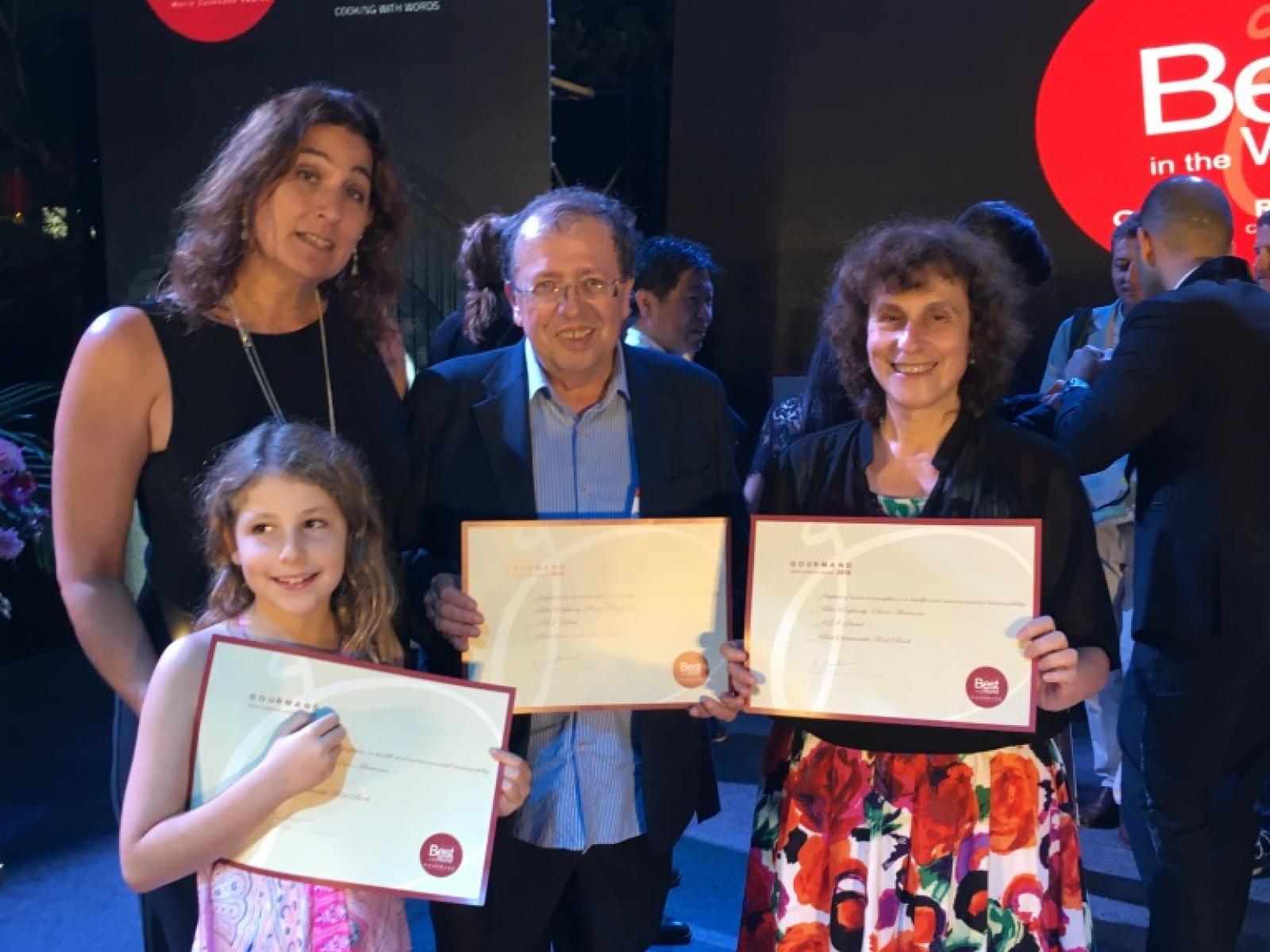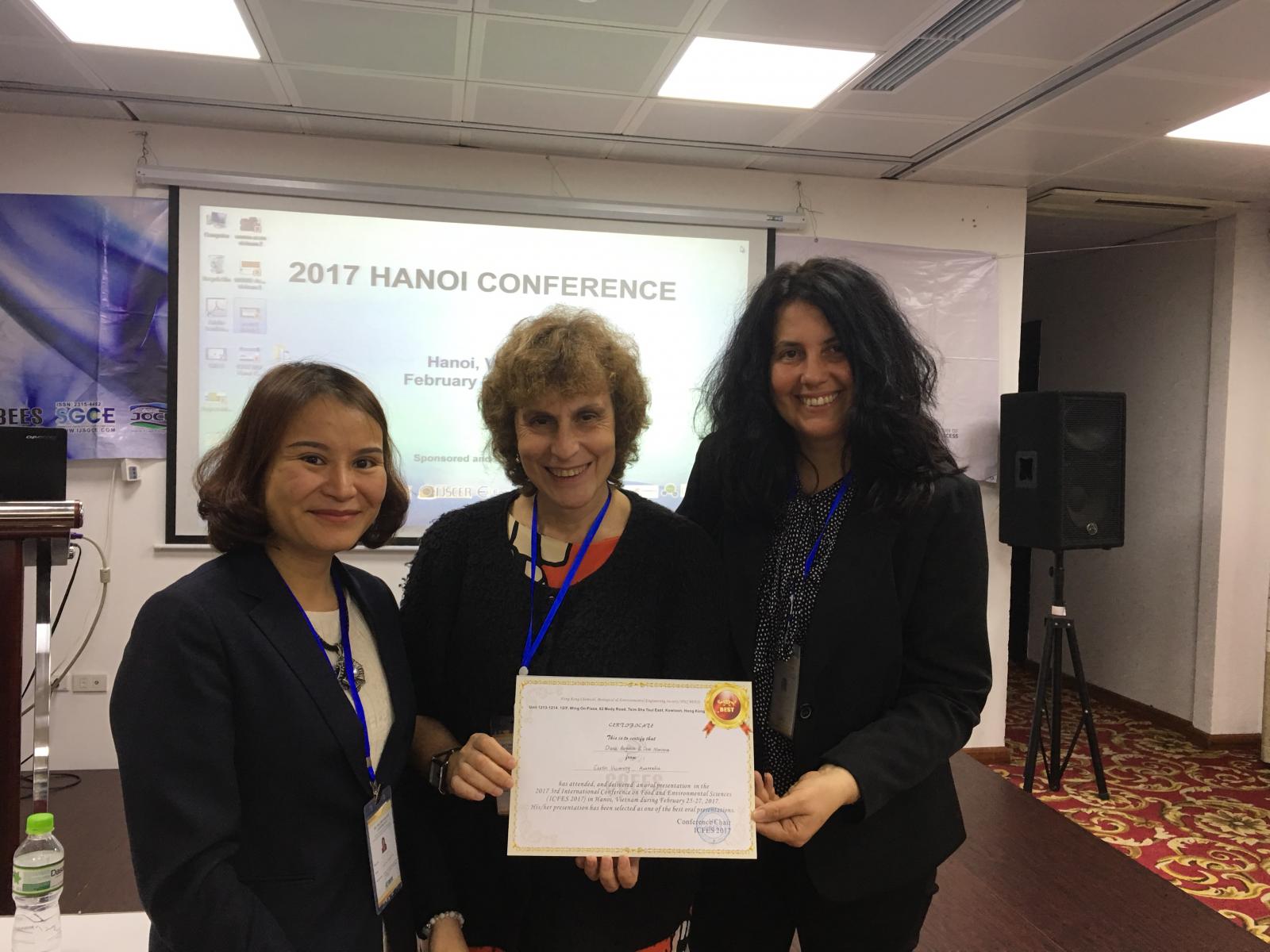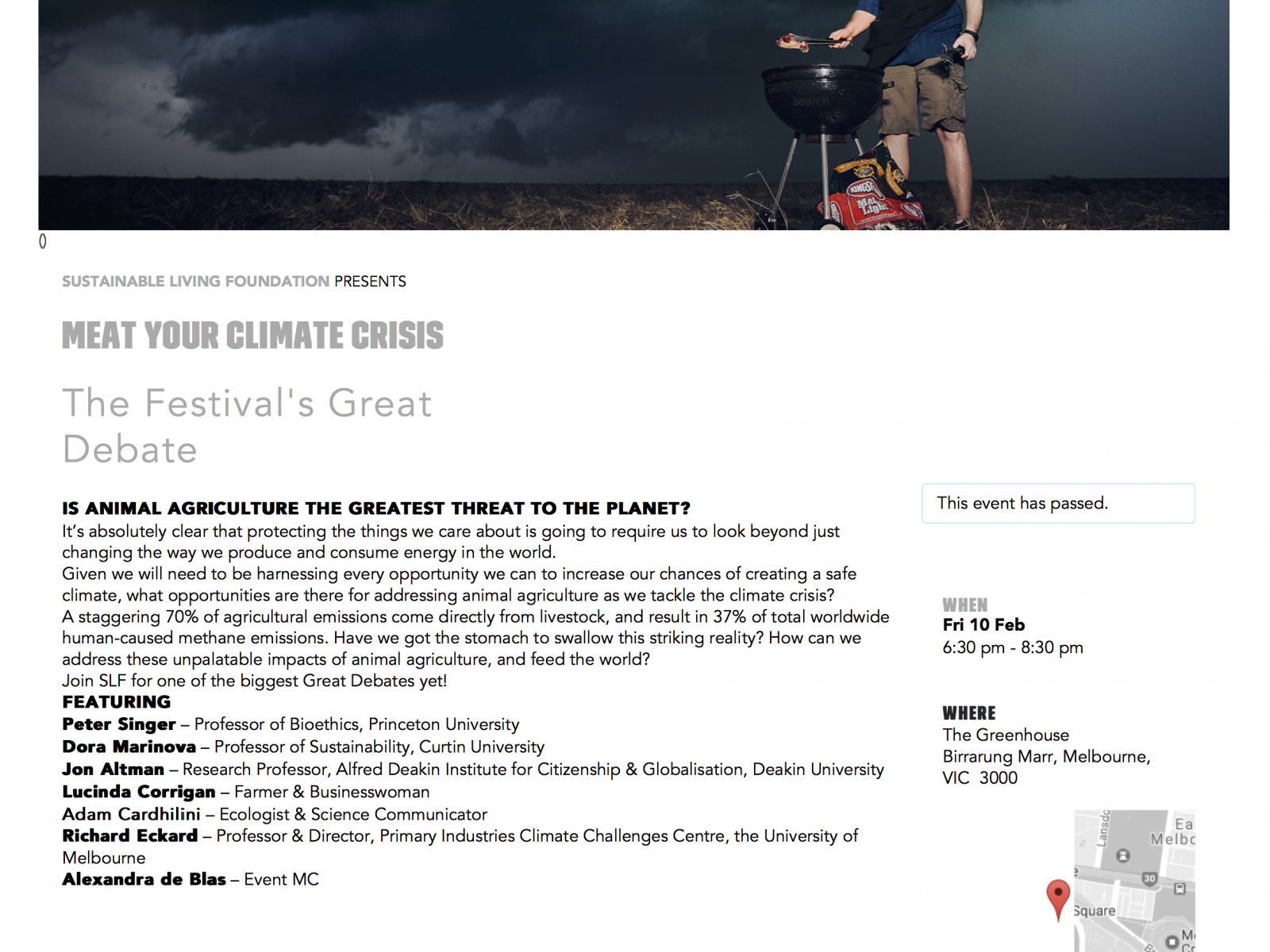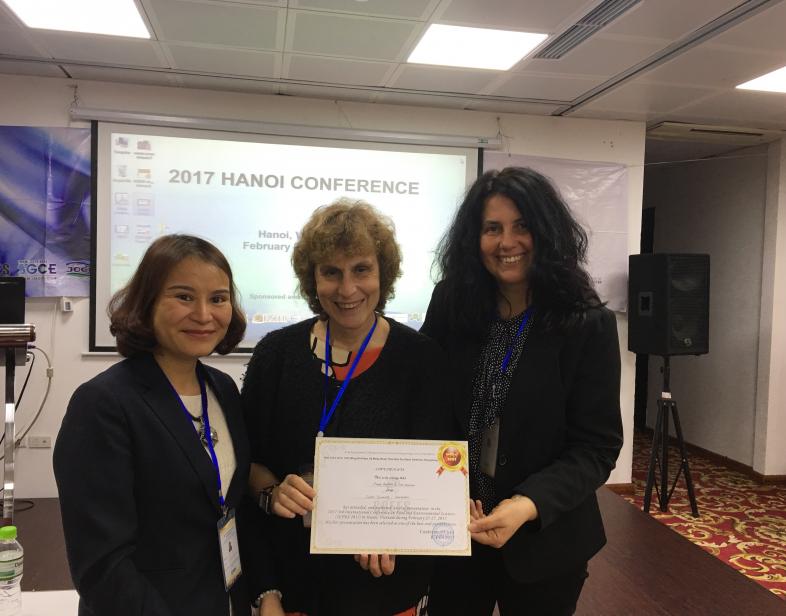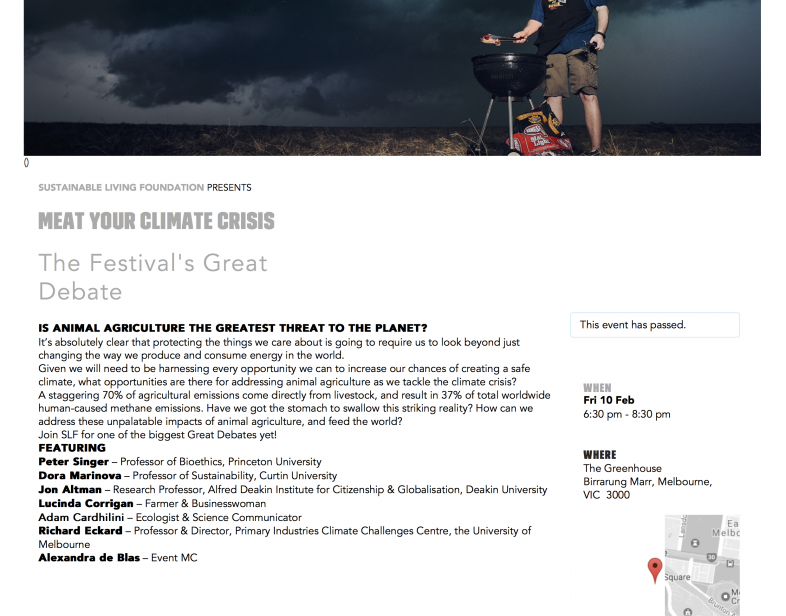An Overview Of Our Solution
According to Oxford University (https://ourworldindata.org/yields-and-land-use-in-agriculture), 27% of the land on this planet is used for livestock, grazing and feed production compared to only 7% for crops for human consumption and 1% for settlements and infrastructure. This fact is ignored by the wealthier countries and sections within society. Human obsession with meat negatively impacts planetary wellbeing as well as people's personal health allowing the commons to be abused for the benefit of a selected few. Our work relates to social marketing and promoting flexitarianism as a behavioural shift towards reducing excessive meat consumption. We publish actively as well as educate people across Australia and the world about the benefits of making a transition towards more plant-based dietary options.
- Population Impacted: Estimated at 89,257
- Continent: Oceania
Context Analysis
The team of Dora Marinova, Talia Raphaely and Diana Bogueva (with many contributors) works on promoting reduction in meat consumption through high quality academic work. Our aim is to encourage flexitarianism – reduction to the limit suggested by reputable health bodies, such as Australia's National Health and Medical Research Council and the American Cancer Research Fund. We are doing this through conducting research, lecturing and participating in the media. Examples include:
The Conversation – 61,061 readers
Two books published by IGI Global available in 128 libraries around the world – 12,800 readers (100 people per library)
Media presence, e.g. Australia's Radio National Science Show – estimated audience 5,000 and for SBS Bulgarian radio - 3,000
Authorship of 22 refereed book chapters and journal articles - estimated readership 4,400 (200 per publication)
Lecturing at Curtin University and internationally – 1600 students
Festivals – 1000 participants
Youtube – 396 visits
Describe the technical solution you wanted the target audience to adopt
The technical solution is to increasingly adopt more plant-based options as the main dietary choice. We refer to this as flexitarianism or reduction in meat consumption. The limit put forward by the Australian Dietary Guidelines is 65g of red meat per day is based only on health and medical research evidence about the negative impacts of higher consumption on health. Our main concern however is environmental as the production and consumption of animal-based products threaten existentially human existence on this planet as well as seriously compromise the habitat of all other species.
To achieve this technical solution, we produce research evidence, educate and disseminate knowledge within Australia and internationally.
Type of intervention
Describe your behavioral intervention
The global per capita supply of meat has been on a constant increase since 1960. Our main aim is to make people in developed countries where meat intake is high (the highest in USA and Australia) and there is abundance of food options to reduce the consumption of animal-based products, particularly red meat. People are unaware of meat's impact and the inequality within different sections of society, across countries and between human and the non-human world. Livestock producers benefit from government subsidies and regimes which support an industry exploitative of the global commons and vulnerable to climate change.
Changing people's dietary habits is very complex - on the surface, it may appear an easy solution to climate change. It is in fact, the solution with the highest immediate beneficial impact on greenhouse gas emissions. The counteracting factors however are deeply rooted in cultural habits and perceptions related to masculinity and strength. Health professionals are similarly unaware or at least do not actively promote plant-based food choices.
We have 22 academic publications and two edited books with scientific evidence about the need to change food choices. The complexity of the issue, based on gluttony and perception of power over other species, requires a suite of approaches and possible solutions. There is no universal way but every effort in the right direction counts and each person can make a difference. These are the messages we give to consumers.
As needed, please explain the type of intervention in more detail
Meat intake in Australia and many other wealthy countries is much higher than the limit stated in dietary guidelines. The intervention is based on exposing people to conclusive scientific evidence about the negative consequences for individual, public and planetary health from excessive meat consumption. We use information as well as peer pressure from people exposed to the evidence. This is particularly relevant to friends and relatives of those who have read or listened to our work. Strong messages about changing choice preferences are having the desired impact.
Describe your implementation
We published two books on flexitarianism and social marketing:
• Raphaely, T., Marinova, D. (eds) (2016) Impact of Meat Consumption on Health and Environmental Sustainability, IGI Global, Hershey, PA, 411 p. - 29 contributors from 7 countries; awarded World Best Book in Sustainable Food by the prestigious 22nd Gourmand Awards (equivalent to the Oscars);
• Bogueva, D., Marinova, D., Raphaely, T. (eds) (2018) Social Marketing and Its Influence on Animal Origin Food Product Consumption, IGI Global, Hershey, PA, 453 p. – 41 contributors from 14 countries.
Building networks across the globe, we conduct research, educate and disseminate the flexitarianism message through books, lectures, engagement with community groups. It is difficult to measure the triggered changes; however, we have enough evidence we are making a difference through feedback from students, colleagues and invitations to participate in many events.
When exposed to the scientific evidence about the negative impacts of meat, people make a conscious decision to reduce their personal intake. In a wealthy society like Australia with many plant-based food options, this transformation is easier than switching to renewable energy, as it does not require additional investment or infrastructure and can happen overnight.
Eating is a social activity. It is important to create an atmosphere encouraging people to share ideas and dishes with more sustainable food. Leading by example applies to us, to our students and the people who know our work.
Meat and Livestock Australia is a powerful organisation which influences Australian culture and the perception about being Australian with aggressive advertising. To counteract this, we have developed a logical practical way of presenting the facts and put forward a new social marketing model requiring government support.
Our biggest strength is building awareness and creating wide networks for the change to build momentum and become mainstream behaviour.
External connections
Our two books established a wide academic network across the world. This strong collaboration is most needed to tackle such a complex issue and avoid further dominance of the western diet at the expense of planetary health.
We are working closely with industry ranging from established vegetarian food producers (e.g. Sanitarium) to new plant-based meat alternatives (e.g. Life Health Foods and Fry's Family Foods). This includes research and interventions targeted at replacing animal-based products with better and healthier options. The World Bank also endorsed the work on combatting climate change through disrupting existing food trends.
Local and State government in Western Australia (e.g. Fremantle, Victoria Park and Whitman Park), State governments in New South Wales and Victoria are engaging with us for community-based initiatives, such as sustainability festivals and public lectures. We work with Dietitians Australia and Doctors for the Environment and have also assisted non-profit organisations, e.g. Sea Shepherd, and community events, e.g. Fairbridge festival, in improving environmental awareness.
Academically we are connected with the food research network at Oxford University, the Global Harmonisation Initiative focussed on food safety and the global Water Network. Very important for us is also the interest from the Australian mainstream media, namely the Australian Broadcasting Corporation (ABC) and the Special Broadcasting Services (SBS).
Who adopted the desired behaviors and to what degree?
We have direct evidence about reduction in meat consumption from the participants in our postgraduate unit Topics in Sustainability. In the last ten years, this unit has used Food as a focus for the delivery of other sustainability issues. We also encourage people to bring and share food once per week explaining why their choice is more sustainable than what people normally eat. Almost 100% of the students adopt flexitarianism, cutting drastically their meat intake and close to 80% eliminate meat altogether. Students select to develop their assignments around food and explore individually particular aspects, such as community gardens, water footprint, waste and packaging. They also translate this knowledge in their everyday life, influencing relatives and friends. In one case, the student opened vegetarian restaurants.
We receive a lot of positive feedback and engagement from people who have read our publications or listened to our presentations which is difficult to quantify.
How did you impact natural resource use and greenhouse gas emissions?
Red meat consumption is the food choice with the heaviest environmental footprint as it uses inefficiently land and water, generates high levels of pollution and is a factor in building antimicrobial resistance. We estimate that satisfying the nutritional requirements in Australia with beef is 113 times less efficient than with, for example, wheat. It also generates 326 more greenhouse gases per food calorie. With every plant-based meal choice people make, they are significantly cutting their impact on natural resource use, reducing greenhouse gas emissions and giving a chance for other species to also exist on this limited planet.
See: Marinova, D., Raphaely, T. (2018) Impact of vegetarian diets on the environment, in Craig, W. (ed.) Vegetarian Nutrition and Wellness, CRC Press/Taylor and Francis, Boca Raton, FL, pp. 13–24
What were some of the resulting co-benefits?
There are many co-benefits from reducing meat consumption, including (1) improving personal health and lowering cancer risks; (2) putting a stop to land conversion for use for livestock and feed purposes and allowing biodiversity conservation; (3) reducing competition for grains in the globalised markets and allowing better food distribution and chance for developing countries to deal with food security; (4) efficient use of resources, such as water, land and food; (5) reduction in the need to use fertilisers to produce animal feed; (6) reduction in the use of antibiotics in industrial animal farms; and many more. In fact, everybody is a winner, except the narrow interests of the livestock, pharmaceutical and associated industries.
Sustainability
So far we have done this without any specific grant support, except two PhD scholarships which were won competitively on merit. However, as the public space is currently full of advertising and messages encouraging people to consume more meat, proper government-supported social marketing interventions are required to see a significant shift in people's diets away from animal-based products.
Return on investment
The investment has been 2 PhD scholarships for 3.5 years and 25% of a professorial salary estimated at US$400,000. An anti-smoking campaign in the 1990s in Australia achieved a 1.4% reduction in smoking prevalence following targeted advertising, increased taxes on cigarettes and other policies encouraging public intolerance. We believe we have achieved much higher reduction rate - at least 30%, among the people who have been exposed to the flexitarian messages. Compared with the anti-smoking campaign which costed $23 per person affected, our impact came at a cost of $15 per person affected. This result is in an environment which does not support meat reduction and in fact actively promotes the consumption of animal-based products.
How could we successfully replicate this solution elsewhere?
A lot of our work is related to social marketing, including a model for successful application. Refer to:
Bogueva, D., Marinova, D., Raphaely, T. (eds) (2018) Handbook of Research on Social Marketing and Its Influence on Animal Origin Food Product Consumption, IGI Global, Hershey, PA, 453 p.
Bogueva, D., Raphaely, T., Marinova, D., Marinova, M. (2017) Sustainability social marketing, in Hartz-Karp, J., Marinova, D. (eds) Methods for Sustainability Research, Edward Elgar, Cheltenham, UK, pp. 280–291
Bogueva, D., Marinova, D. (2017) Metamorphosis in the semantics of the link between man, food and masculinity, Science, 6, 16–23 [in Bulgarian]
Bogueva, D., Marinova, D., Raphaely, T. (2017) Reducing meat consumption: the case for social marketing, Asia Pacific Journal of Marketing and Logistics, 29(3), 477–500
Government investment similar to anti-smoking campaigns and sunscreen protection can be very efficient.
